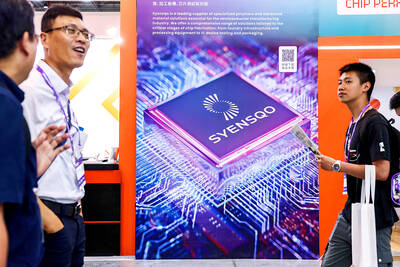Micron Technology Inc, the biggest US maker of computer memory, on Friday rose the most in five weeks after reporting fiscal fourth-quarter sales and profit that exceeded some analysts’ estimates.
Micron shares climbed 7.7 percent to US$15.91 at the close in New York, the biggest single-day advance since Aug. 27. The stock had lost 58 percent of its value this year through Thursday.
Net income in the period ended on Sept. 3 fell from US$1.15 billion a year earlier, or US$0.96 per share, to US$471 million, or US$0.42 a share, the Boise, Idaho-based company said in a statement on Thursday, adding that revenue declined 15 percent to US$3.6 billion.
Analysts had projected sales of US$3.56 billion. Profit, excluding certain items, was US$US0.37 a share, topping the US$0.33 average analysts’ estimate compiled by Bloomberg.
Micron makes chips that provide short-term memory in computers and servers, as well as other semiconductors that store data in mobile devices. The company and its competitors — Samsung Electronics Co and SK Hynix Inc — are producing more than enough chips to meet lackluster demand, causing prices to fall.
Micron projected sluggish growth in the current quarter as demand for PCs continues to decline. Investors might use the company’s outlook as a bellwether for reports by larger US and global technology companies later this month.
While Micron projected little growth, the company’s sales forecast for the current quarter topped some of the most pessimistic analysts’ projections.
“We expect the demand environment to stabilize and improve as we move through calendar 2016,” Micron said in its presentation.
Micron is the largest remaining US-based maker of computer memory, also known as dynamic random access memory, or DRAM, chips. The company is expanding its offerings to include memory for smartphones and servers and another type of chips used as storage in mobile devices and computers.

SEMICONDUCTOR SERVICES: A company executive said that Taiwanese firms must think about how to participate in global supply chains and lift their competitiveness Taiwan Semiconductor Manufacturing Co (TSMC, 台積電) yesterday said it expects to launch its first multifunctional service center in Pingtung County in the middle of 2027, in a bid to foster a resilient high-tech facility construction ecosystem. TSMC broached the idea of creating a center two or three years ago when it started building new manufacturing capacity in the US and Japan, the company said. The center, dubbed an “ecosystem park,” would assist local manufacturing facility construction partners to upgrade their capabilities and secure more deals from other global chipmakers such as Intel Corp, Micron Technology Inc and Infineon Technologies AG, TSMC said. It

EXPORT GROWTH: The AI boom has shortened chip cycles to just one year, putting pressure on chipmakers to accelerate development and expand packaging capacity Developing a localized supply chain for advanced packaging equipment is critical for keeping pace with customers’ increasingly shrinking time-to-market cycles for new artificial intelligence (AI) chips, Taiwan Semiconductor Manufacturing Co (TSMC, 台積電) said yesterday. Spurred on by the AI revolution, customers are accelerating product upgrades to nearly every year, compared with the two to three-year development cadence in the past, TSMC vice president of advanced packaging technology and service Jun He (何軍) said at a 3D IC Global Summit organized by SEMI in Taipei. These shortened cycles put heavy pressure on chipmakers, as the entire process — from chip design to mass

People walk past advertising for a Syensqo chip at the Semicon Taiwan exhibition in Taipei yesterday.

NO BREAKTHROUGH? More substantial ‘deliverables,’ such as tariff reductions, would likely be saved for a meeting between Trump and Xi later this year, a trade expert said China launched two probes targeting the US semiconductor sector on Saturday ahead of talks between the two nations in Spain this week on trade, national security and the ownership of social media platform TikTok. China’s Ministry of Commerce announced an anti-dumping investigation into certain analog integrated circuits (ICs) imported from the US. The investigation is to target some commodity interface ICs and gate driver ICs, which are commonly made by US companies such as Texas Instruments Inc and ON Semiconductor Corp. The ministry also announced an anti-discrimination probe into US measures against China’s chip sector. US measures such as export curbs and tariffs